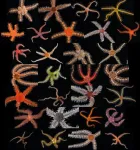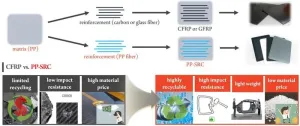(Press-News.org) Ambitious global $1 billion per year ‘mission science’ model needed to win on sustainable development in time, warns experts
From the climate emergency and global health to the energy transition and water security, new report argues the global science and science funding efforts must be fundamentally redesigned and scaled up to meet complex needs of humanity and the planet.
July 17, 2023, NEW YORK – The current sustainability science model requires a fundamental redesign to keep up with the pace and complexity of the challenges facing the planet, argues the high-level Global Commission on Science Missions for Sustainability.
In a new report launched at the UN’s High-Level Political Forum, the Commission warns that prevailing science design, funding and practice fail to address complex global issues at the speed and scale required.
To rectify the issue, the Commission recommends setting up an ambitious $1 billion per year ‘mission science’ network of Regional Sustainability Hubs around the world. These Hubs would tackle context-specific and complex issues – from climate change and malnutrition to water security and clean energy – through a systematic engagement process, from problem definition to implementation, with key stakeholders in regions wherever they are needed, particularly in the Global South.
A collective investment of this size is not even one percent of the global annual R&D budget, yet it would significantly accelerate the progress towards the implementation of the 2030 Agenda.
“Sustainability is no longer an aspiration; it has become an imperative,” said Ambassador Csaba Kőrösi, President of the UN General Assembly. “To seek integrated and sustainable solutions, policy and political decisions at the United Nations must be supported by science-based evidence.”
As described in the report Flipping the Science Model: A Roadmap to Science Missions for Sustainability, the Commission calls for a ‘mission science’ approach, meant to overcome the fragmented, compartmentalized scientific knowledge that often fails to connect with and to address society’s most immediate needs. It seeks to work in a transdisciplinary, collaborative way that is demand-driven and outcome-oriented.
Convened by the International Science Council (ISC), the Commission includes the former heads of UN agencies and government ministries as well as heads of national science academies and foundations.
“Just as the global community has used big science approaches to build infrastructure like CERN and the Square Kilometer Array, a similar mindset should be applied, particularly in the Global South, to address sustainable development challenges,” said Commission co-Chair Irina Bokova, former Director-General of UNESCO. “Unless funders accept the need to transform their funding instruments to promote transdisciplinary stakeholder-engaged research, science will continue to be under-exploited in addressing the challenges of the 2030 Agenda.”
“Actionable scientific knowledge can be generated only through frank dialogues between scientists and funders based on trust,” said Peter Gluckman, President, ISC and Salvatore Aricò, CEO, ISC. “The same applies to the interaction of scientists with policy-makers on the one hand and with local and indigenous communities on the other, as both sides are exposed to the need to find solutions to complex sustainability challenges at multiple scales.”
As a proof of concept, the Commission is calling for financial support for a series of pilots over an 18-month period to demonstrate the delivery of mission-led research through these Hubs and refine their approach further, with the ultimate goal of around 20 Hubs operating thereafter.
Real-life interventions
The Hubs would provide a framework to do science for the SGDs differently. They would allow to develop context-specific solutions to sustainability challenges, at the local and global scales – ensuring that science is fit-for-purpose, inclusive and results-driven to address the complex real-world situations it seeks to transform. In Nepal, for example, increased damming of rivers that drain from the Himalayas to India is intended to provide for the growing energy needs of multiple regions across national boundaries as well as a source of economic growth. Likewise, building roads and railways to connect with neighboring countries in the north and the south could provide not just economic benefits at national scales but also access to facilities for remote communities.
Similarly, the Zambezi River basin in southern Africa is a critical resource in providing the food, energy, water and ecosystems support of the surrounding population. All these developments would require a science-based understanding of trade-offs, unintended consequences and risks that may arise with such developments, with important implications for the short- and long-term wellbeing of economies, communities and ecosystems.
ENDS
Notes to editors
For an embargoed copy of the report, further information or interview requests, contact:
Matthew Stafford
Marchmont Communications
matthew@marchmontcomms.com
+44 (0) 7788 863 692
About the International Science Council
The International Science Council (ISC) is a non-governmental organization that convenes the scientific expertise and resources needed to lead on catalyzing, incubating and coordinating impactful international action. It is the largest organization of its kind to bring together natural and social sciences for the global public good.
About the Global Commission on Science Missions for Sustainability
In response to the insufficient progress made on the SDGs, the Global Commission on Science Missions for Sustainability was established in 2021 by the International Science Council and tasked with operationalizing the core conclusions and recommendations of an earlier report, Unleashing Science.
END
Ambitious global $1 billion per year ‘mission science’ model needed to win on sustainable development in time, warns experts
rom the climate emergency and global health to the energy transition and water security, new report argues the global science and science funding efforts must be fundamentally redesigned and scaled up to meet complex needs of humanity and the planet.
2023-07-17
ELSE PRESS RELEASES FROM THIS DATE:
New study uncovers taxonomic breakthrough in the common ophiuroid Ophiothrix angulata (Echinodermata: Ophiuroidea)
2023-07-17
Ophiothrix angulata, a widely recognized and prevalent ophiuroid species in the Western Atlantic, has long been the subject of taxonomic debate due to its remarkable morphological diversity. A new study just published in PeerJ Life & Environment has shed light on the species' taxonomy, revealing a significant scientific breakthrough.
Led by a team of researchers from Universidad Nacional Autónoma de México, Universidad Católica del Maule and Florida Natural History Museum, the comprehensive study aimed to assess species delimitation ...
Sergio Amancio receives 2023 Yoshiaki Arata Award
2023-07-17
On the occasion of its annual general assembly in Singapore on 16 July 2023, the International Institute of Welding presented Sergio Amancio, from the Institute of Materials Science, Joining and Forming at Graz University of Technology (TU Graz), with this year’s Yoshiaki Arata Award in recognition of his scientific achievements. This award, consisting of a medal and a certificate, is considered one of the world’s most important awards for research in welding and additive manufacturing and usually goes to veteran researchers who are recognised for their life’s work. For ...
Current evidence identifies health risks of e-cigarette use; long-term research needed
2023-07-17
Statement Highlights:
The number of people who use electronic nicotine delivery systems, typically referred to as e-cigarettes, has grown exponentially, especially among youth and young adults. E-cigarette use more than doubled from 2017 to 2019 among middle and high school students.
Ingredients of e-cigarettes, including nicotine, flavoring agents, sweeteners and propylene glycol and vegetable glycerol, may each independently pose dangerous health risks.
More clinical studies on the long-term impact of e-cigarettes on the heart, blood vessels and lungs are needed, and experts emphasize additional molecular and laboratory research ...
Developing new materials to accelerate the arrival of 'air taxis'
2023-07-17
In order for future mobility, such as urban air mobility (UAM), to become a reality, it must be fuel efficient and reduce carbon emissions, which requires the development of new materials with excellent physical properties and recyclability. Self-reinforced composites (SRCs) are inexpensive, lightweight, and have advantages in terms of disposal and recycling as the reinforcement and the base material are composed of the same material. For this reason, it is attracting attention as a next-generation composite material to replace carbon fiber-reinforced composites used in aircraft.
Korea Institute of Science and Technology (KIST, President ...
New findings suggest historical infanticide in Europe likely more widespread than estimated
2023-07-17
‘Routine’ infanticide of newborns by married parents in early modern Europe was a much more widespread practice than previously thought, a new book posits.
This fresh insight sits at the heart of a new book, Death Control in the West 1500–1800: Sex Ratios at Baptism in Italy, France and England, by Gregory Hanlon and contributors.
The French-trained behavioural historian explains: “In most cases, infanticide was a crime leaving no aggrieved party seeking revenge if it was committed right away. It could be overlooked and forgotten with the passage of time.”
Widespread infanticide
Hanlon, who is Distinguished Research Professor at Dalhousie University in ...
Prescribing psychostimulants for people at risk of overdose
2023-07-17
Growing evidence supports prescribing psychostimulant medications to help reduce use of illegal stimulants such as methamphetamine, authors write in a CMAJ (Canadian Medical Association Journal) commentaryhttps://www.cmaj.ca/lookup/doi/10.1503/cmaj.230266.
Illegal stimulant use is rising, judging by the presence of these drugs in at least half of all opioid deaths in Canada in 2022.
Following evidence from clinical trials in Australia, Europe and the United States, physicians and nurse practitioners in Canada and other countries are increasingly prescribing psychostimulants as harm reduction for stimulant use disorder.
"This emerging ...
THE LANCET ONCOLOGY: Cancer experts call for cancer care to be centred on patients rather than the commercial bottom-line
2023-07-17
Commercial, rather than patient interests, often drive cancer care and research and patients deserve better, argue a group of global oncologists and patient advocates in a Comment published in The Lancet Oncology journal. The authors also establish core guidelines for the development of a new patient-centred movement in cancer care - Common Sense Oncology.
The Comment says there has been a shift over the past few decades from predominantly publicly funded clinical trials designed to answer questions important to patients, to industry-funded trials which aim to achieve ...
Significant rise in ADHD diagnoses in the UK
2023-07-17
Both ADHD diagnoses and prescriptions for ADHD medication have increased significantly over the past two decades, except in children under five, finds a new study by UCL researchers.
The research, published in BJPsych Open, reviewed data from 7 million individuals aged three to 99, from IQVIA Medical Research Data, a UK primary care database, between 2000 and 2018.
Of these individuals, 35,877 had an ADHD diagnosis and 18,518 received prescriptions for ADHD medication from their GP.
Although the number of individuals receiving medication for ADHD is still relatively low, the researchers found ...
New guidelines for diagnosing Alzheimer's
2023-07-16
Today at the International Alzheimer's Congress (AAIC) in Amsterdam, new guidelines for diagnosing Alzheimer's disease developed by clinicians and researchers from around the world were presented. In these criteria, the disease is diagnosed in the clinic through the use of blood biomarkers, just as with other major diseases such as diabetes and cardiovascular disease.
A blood test has been developed for this purpose in recent years that gives very good results, according to recent research. Charlotte Teunissen, professor of neurochemistry at Amsterdam ...
Discovery could lead to more treatments to prevent cancer and infectious diseases
2023-07-16
Researchers have cracked how a particular type of immune cell develops in the body and protects against infection and disease. And the discovery could help in the development of more preventive treatments, according to a new study.
The research, led by Murdoch Children’s Research Institute and Federation University Australia, has uncovered how these specialised white blood cells operate and can produce an immune response.
Associate Professor Dan Pellicci said by understanding the function of these cells, they could be harnessed to help prevent cancer and highly infectious diseases such as ...
LAST 30 PRESS RELEASES:
Emerging class of antibiotics to tackle global tuberculosis crisis
Researchers create distortion-resistant energy materials to improve lithium-ion batteries
Scientists create the most detailed molecular map to date of the developing Down syndrome brain
Nutrient uptake gets to the root of roots
Aspirin not a quick fix for preventing bowel cancer
HPV vaccination provides “sustained protection” against cervical cancer
Many post-authorization studies fail to comply with public disclosure rules
GLP-1 drugs combined with healthy lifestyle habits linked with reduced cardiovascular risk among diabetes patients
Solved: New analysis of Apollo Moon samples finally settles debate about lunar magnetic field
University of Birmingham to host national computing center
Play nicely: Children who are not friends connect better through play when given a goal
Surviving the extreme temperatures of the climate crisis calls for a revolution in home and building design
The wild can be ‘death trap’ for rescued animals
New research: Nighttime road traffic noise stresses the heart and blood vessels
Meningococcal B vaccination does not reduce gonorrhoea, trial results show
AAO-HNSF awarded grant to advance age-friendly care in otolaryngology through national initiative
Eight years running: Newsweek names Mayo Clinic ‘World’s Best Hospital’
Coffee waste turned into clean air solution: researchers develop sustainable catalyst to remove toxic hydrogen sulfide
Scientists uncover how engineered biochar and microbes work together to boost plant-based cleanup of cadmium-polluted soils
Engineered biochar could unlock more effective and scalable solutions for soil and water pollution
Differing immune responses in infants may explain increased severity of RSV over SARS-CoV-2
The invisible hand of climate change: How extreme heat dictates who is born
Surprising culprit leads to chronic rejection of transplanted lungs, hearts
Study explains how ketogenic diets prevent seizures
New approach to qualifying nuclear reactor components rolling out this year
U.S. medical care is improving, but cost and health differ depending on disease
AI challenges lithography and provides solutions
Can AI make society less selfish?
UC Irvine researchers expose critical security vulnerability in autonomous drones
Changes in smoking status and their associations with risk of Parkinson’s, death
[Press-News.org] Ambitious global $1 billion per year ‘mission science’ model needed to win on sustainable development in time, warns expertsrom the climate emergency and global health to the energy transition and water security, new report argues the global science and science funding efforts must be fundamentally redesigned and scaled up to meet complex needs of humanity and the planet.


